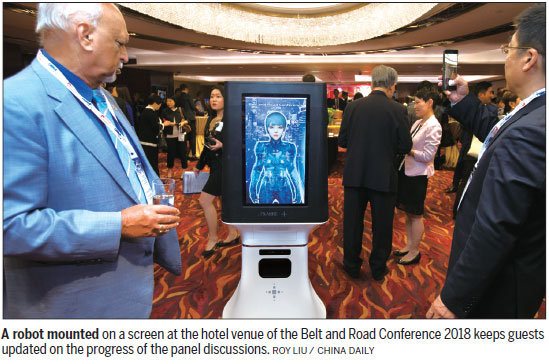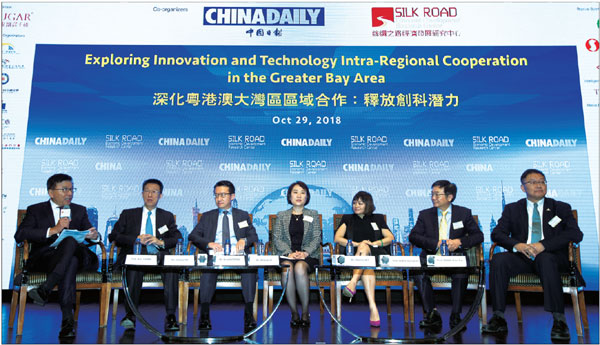Bay Area poised to power nation forward
Updated: 2018-10-30 08:20
By David Ho in Hong Kong(HK Edition)
|
|||||||||
Experts at Belt and Road Conference review key strategies in developing the Bay Area, vis-a-vis the BRI, convinced there're rich rewards to be reaped
Two of China's biggest initiatives - the Belt and Road and the Guangdong-Hong Kong-Macao Greater Bay Area - could support each other as development progresses.
The view was espoused by prominent business leaders and professionals during panel discussions held in conjunction with the Belt and Road Conference 2018, co-organized by China Daily and the Silk Road Economic Development Research Center, in Hong Kong on Monday.
The conference - the fourth held so far on the Belt and Road Initiative - included three panel discussions and a number of keynote addresses on the theme "Tapping Belt and Road Opportunities in the Greater Bay Area".
The first panel dialogue, themed "Exploring Innovation and Technology Intra-Regional Cooperation in the Greater Bay Area", was chaired by Ceajer Chan Ka-keung, adjunct professor of finance at the Hong Kong University of Science and Technology and former secretary for financial services and the treasury of the HKSAR.
He kicked off the discussions by encapsulating the importance of the Bay Area as an "important supply chain to the world", saying there's "no other place like it".
Other panelists backed Chan's assessment, with a consensus that the Bay Area's unique position has given rise to special opportunities and challenges.
George He, senior vice-president at Lenovo and president of the Lenovo Capital and Incubator Group, touched on Hong Kong's role in the Bay Area.
"The Bay Area is a great opportunity for Hong Kong to be a great connector for startups. It has a role in developing high tech and robotics from Chinese startups and helping them expand overseas," he said.
Great opportunities ahead
He said the SAR's strengths in the field of research and development are not to be underestimated as well.
"There're a lot of great opportunities at Hong Kong universities. They have great technology, professors and students," he said.
Besides innovation-based industries, traditional businesses could benefit from the initiatives too.
Arnold Cheng, director of Hong Kong and Pearl River Delta for John Swire and Sons (China), said he's still excited over the Bay Area development despite his dealings with the more traditional business areas.
"All these developments are opportunities for us. The home market (in Hong Kong) will expand from 7 million to 68 million. And, with the key infrastructures in place, one can now easily go from Shenzhen's Futian district to Hong Kong airport in about an hour," he said.
The sudden boom and connectivity means a fast growing market for all, said Cheng, convinced that his company's beverage-and-property development businesses will stand to benefit.
"Besides an enlarged home market, it also means there'll be more people resources to grow our businesses."
However, there's still much work to be done, Cheng noted, with three main areas of development in store - integrating the Bay Area into a single market; enhancing its competitiveness by increased collaboration among member cities in the Bay Area; and ensuring the free flow of people, information, capital and goods within it.
Not only would such a scenario benefit the region itself, it could build up the expertise to support countries along the BRI route.
Doris Luey, head of social innovation for New World Development, pointed out that the shared tech innovations within the Bay Area could help boost industries.
"Technology brings a lot of disruption. We're facing the fourth industrial revolution, and the Bay Area could be an opportunity to transform these traditional businesses," he said.
E Zhihuan, chief economist at Bank of China (Hong Kong), reckons that financial technology, in particular, could find a great playground in the area.
"Artificial intelligence development can experience a growth spurt and enter the disruptive phase in the fintech of the Bay Area," she said.
Luey, however, pointed out that the different policies of the three jurisdictions in the Bay Area might need to be sorted out.
"Mobile payment is a powerful tool. In the Bay Area, we have different policies and compliance terms concerning it. How do we work through the different privacy ordinances and integrate the systems?" she asked.
The subject of regulatory differences also came up during the discussions.
"The Bay Area is different from other world bay areas because of the 'one country, two systems' policy in Hong Kong and Macao. It allows us to be more dynamic and to conduct experiments before exporting to the external market. Thus, it should not be measured by the same metrics as other bay areas in the world," said Chan.
He also referred to the results of a survey conducted by consulting firm KPMG on the Bay Area.
"The key benefits of the Bay Area would be the free flow of talent, greater regional ties, and better market penetration. But, to deal with the challenges facing it, policy barriers and government foresight in planning capabilities were highlighted," said Chan.
A place for new ideas
Also, there might be a clash arising from the difference in government attitudes toward their own economies.
"The difference between the mainland and here (Hong Kong) includes market-driven and planned economies. Each system is based on its beliefs in the market. We should see the Bay Area as a place to try out new ideas and compromise to make effective policies to promote global economy," said Wong Kam-fai, associate dean of external affairs at the Chinese University of Hong Kong's Faculty of Engineering.
Cheng agreed that integration could be a tough process.
"The governments have been working hard to address many of these integration issues. What's left is tough, and is not likely to be worked through in a month or even a year. But, they're working toward it," he said.
Cheng suggested that two areas should be looked at. "The Bay Area can be a tourism destination. It can make for a one-journey, multiple-destination spot. However, most tourists get a single entry visa for the mainland. It would be hard for them to move from say, Shenzhen to Hong Kong to Zhuhai because of it," he noted, adding that being a tourism hotspot could promote the Bay Area to those who are unaware of it.
Besides tourism, another area would the development of a circular economy in the region.
Chen Guanghan, associate dean and chief expert at the Institute of Guangdong Hong Kong and Macao Development Studies of Sun Yat-sen University, thinks that a better-integrated Bay Area could lead to more innovations.
"Innovation is a key ingredient for the region's success. We can, and should, integrate our resources in knowledge transference," he urged.
"If we can replicate Hong Kong's success as a financial center, we should do it for the Bay Area to be known as a center of innovation for the Belt and Road countries and the rest of the world," he added.
Nonetheless, all the panelists were on the same page that there're rich rewards to be reaped from the Bay Area development, especially in relation to the BRI.
"Despite the challenges, there are tremendous opportunities to be found in the Bay Area as an external-looking area that will power a nation going forward," Chan concluded.
For China Daily
|
Panelists delve into the Guangdong-Hong Kong-Macao Greater Bay Area’s distinct advantages, saying its unique position has given rise to special opportunities and challenges, while warning of a possible “clash” arising from the difference in the governments’ attitudes toward their own economies. From left: Ceajer Chan Ka-keung, former secretary for financial services and the treasury; George He, senior vice-president of Lenovo and president of Lenovo Capital and Incubator Group; Arnold Cheng, Hong Kong and Pearl River Delta director at John Swire and Sons (China); E Zhihuan, chief economist at Bank of China (Hong Kong); Doris Luey, head of social innovation at New World Development; Chen Guanghan, associate dean and chief expert at the Institute of Guangdong, Hong Kong and Macao Development Studies of Sun Yat-sen University; and Wong Kam-fai, associate dean (external affairs), Faculty of Engineering at the CUHK. roy liu / China daily |

(HK Edition 10/30/2018 page6)
